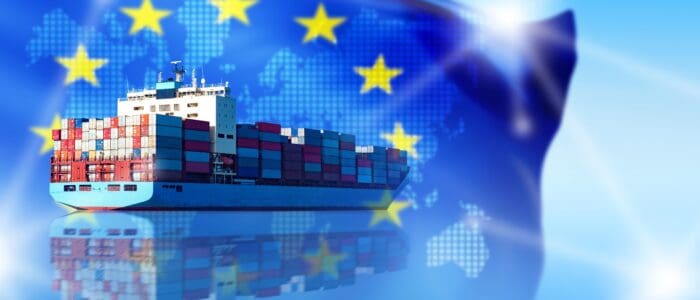Published
Event Summary: Trading Up: How EU Trade Policy Can Lead to Better Market Access and More Resilient Sourcing
By: Fredrik Erixon Guifré Margarit i Contel
Subjects: EU Trade Agreements European Union Regions WTO and Globalisation

On May 14, 2024, together with Europe Unlocked, we organised a conference titled “Trading Up: How EU Trade Policy Can Lead to Better Market Access and More Resilient Sourcing.” The event, held in Brussels, featured a keynote speech by Sabine Weyand, Director-General at DG Trade (European Commission), followed by a panel discussion with key trade experts.
The Executive Director of Europe Unlocked Kieran O’Keeffe and ECIPE Director Fredrik Erixon welcomed the attendees to the event while setting the stage by highlighting the challenging global trade environment. They emphasised the urgency and capability to address these challenges through alliances and growth.
Following them, Ms Weyand addressed the audience during a keynote speech that revolved around the evolving landscape of international trade and the EU’s strategic response. She reflected on the significant transformations in global trade over the past three decades since the establishment of the World Trade Organization (WTO). She noted that the benefits of interdependence, efficiency, and rules-based cooperation, long taken for granted, are now viewed through a lens of economic security and resilience. The recent geopolitical tensions, particularly between the US and China, and crises like the Covid-19 pandemic and Russia’s invasion of Ukraine, have disrupted global supply chains, prompting a paradigm shift towards resilience over mere efficiency.
“Mutual economic interdependence is nowadays often seen as a risk, rather than an opportunity.”
Sabine Weyand on how the changed environment of international trade and how we adapted trade policy.
Ms Weyand highlighted the EU’s success in leveraging its diverse global trade network to absorb major shocks, citing the Covid-19 pandemic and the shift away from Russian energy supplies as examples. These instances underscored the importance of diversified trade ties in ensuring resilience. She pointed out the EU’s strategic engagements through trade agreements to secure critical inputs and export opportunities, making the EU a global leader in international trade.
“Our diversified trade ties are efficient in responding to policy shocks.”
Sabine Weyand on the effect of global trade networks to absorb major political shifts.
During her speech, she also foresaw several emerging trends that will shape trade policy, including geopolitical flux, economic pressures from China’s industrial policies, the green transition, and technological advancements. She called for an integrated approach, combining internal and external policies to enhance the EU’s economic competitiveness and resilience.
Ms Weyand emphasised the need for coherence between internal market regulations and global competitiveness, suggesting that regulations must consider their impact on EU companies’ global competition and on international partners. Weyand also stressed improving coherence in external policies and enhancing coordination between EU-level and member state actions, particularly in investment screening and export control.
Next, ECIPE’s Chief Economist Erik van der Marel moderated a panel discussion which featured insights from Pascal Kerneis, Managing Director at European Services Forum (ESF); Grainne O’Carroll, Trade Counsellor at Permanent Representation of Ireland to the EU; and Fredrik Erixon.
Ms O’Carroll emphasised the role of policymakers in setting and ensuring effective rules for fair competition. She highlighted the importance of market internationalisation, especially for Ireland, and the need for practical implementation of adequacy frameworks and mutual recognition agreements.
Mr Kerneis discussed the necessity of market access through FTAs, stressing that resilience does not mean closing off trade. He pointed out the limited presence of financial services in FTAs and called for modernising agreements to better reflect the service sector’s growth potential.
Mr Erixon underscored the importance of understanding the consequences of EU regulations on trade partners and advocated for joining the Comprehensive and Progressive Agreement for Trans-Pacific Partnership (CPTPP). He argued for openness and diversification as key strategies for resilience.
The conference concluded with a consensus on the need for an integrated and coherent EU trade policy that balances economic security and competitiveness. The discussions underscored the importance of diversified trade relations, strategic partnerships, and effective implementation of trade agreements to navigate the complexities of the modern global trade environment.
The event was accompanied by the launch of a report with the same title that you can download clicking the button below: